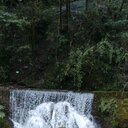By Activating Akt/eNOS Bilobalide B Inhibits Autophagy and Promotes Angiogenesis Following Focal Cerebral Ischemia Reperfusion.
Keywords
Abstract
OBJECTIVE
Ischemic stroke is a leading cause of long-term disability. To date, there is no effective treatment for stroke. Previous studies have shown that Ginkgo biloba extract has protective effects against neurodegenerative disorders. In this present study, we sought to test the potential protective role of an active component of Ginkgo biloba extract, bilobalide, in a rat model of middle cerebral artery occlusion (MCAO).
METHODS
A rat model of MCAO was used to test the potential protective effects of Bilobalide B on stroke protection. TTC staining was performed to evaluate infarct size of the brains. Neurological deficit score was measured to reveal the effects of the treatments on animal behavior and cognition. Immunohistochemical staining and transmission electronic microscope analysis were performed to measure the cellular responses to drug treatment. Western blotting and ELISA were performed. The expression of Cleaved- Casepase 3, Beclin-1, p62 and LC3I/II were quantified, and the Phosphorylation of eNOS and Akt were evaluated. The ratio of Bcl-2/ Bax was determined to reveal the molecular pathways that are involved in the drug treatment.
RESULTS
We found that intraperitoneal delivery of various Bilobalide doses during ischemia can protect against brain injury, as evidenced by reduced infarct size and improved neurological scores after surgery. Histochemical analysis revealed that treatment with bilobalide can significantly reduce apoptosis, autophagy, and promote angiogeneis following ischemia/reperfusion injury to the brain. The performence of increased phosphorylation of eNOS and Akt suggested that bilobalide can activate Akt prosurvival and eNOS pathways to promote cell survival and angiogenesis, respectively.
CONCLUSIONS
Our results suggested that bilobalide benefits stroke symptoms by reducing cell death pathways and promoting angiogenesis. As such, bilobalide may be a potential agent for improving self-repair after ischemic stroke.



